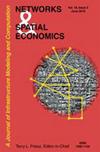Vietnam and Russia: Mutual Economic Cooperation in Changing Geopolitical and Geo-Economic Conditions
IF 1.5
3区 工程技术
Q3 OPERATIONS RESEARCH & MANAGEMENT SCIENCE
引用次数: 0
Abstract
The issues of mutual economic relations between Vietnam and Russia (SRV) in the context of global transformations are studied. In Soviet times, it was based on technical and financial assistance to the USSR, which was determined by ideological proximity and geopolitical interests. Market transit and the orientation of the new Russia to the West sharply reduced the volume of economic interaction. In the 2000s, during the recovery growth and the transition to a multi-vector foreign policy, mutual trade relations began to grow, but they were much slower in terms of trade with regional partners. In the last decade, the role of geopolitics has increased again, and, above all, the peculiarities of relations between both countries with China and the United States. Over the years of cooperation between the SRV and the Russian Federation, an extensive system of relations at the political level has been built. But this does not create a sufficient incentive for the development of economic relations. At the level of business structures directly involved in their construction, the influence of global geopolitical processes and geo-economic conditions is felt more strongly. The situation for mutual economic ties has deteriorated greatly in the face of harsh Western sanctions. The study showed that geo-economic conditions of cooperation can be improved by developing institutions that mutually promote commercial proposals to each other’s markets and create business models for their implementation越南和俄罗斯:地缘政治和地缘经济条件变化中的相互经济合作
在全球转型的背景下,越南和俄罗斯(SRV)之间的相互经济关系的问题进行了研究。在苏联时期,这是基于对苏联的技术和财政援助,这是由意识形态上的接近和地缘政治利益决定的。市场转轨和新俄罗斯向西方的定位大大减少了经济互动的数量。进入21世纪后,在经济复苏增长和向多向度外交政策转型的过程中,双边贸易关系开始增长,但与区域伙伴的贸易增速明显放缓。在过去的十年里,地缘政治的作用再次增加,最重要的是,两国与中国和美国之间的特殊关系。在SRV和俄罗斯联邦之间多年的合作中,已经建立了一个广泛的政治关系体系。但这并没有为经济关系的发展创造足够的动力。在直接参与其建设的业务结构层面,全球地缘政治进程和地缘经济条件的影响更为强烈。面对西方严厉的制裁,两国经济关系的形势大大恶化。该研究表明,通过建立相互向对方市场推广商业建议并为其实施创造商业模式的机构,可以改善合作的地缘经济条件
本文章由计算机程序翻译,如有差异,请以英文原文为准。
求助全文
约1分钟内获得全文
求助全文
来源期刊

Networks & Spatial Economics
社会科学-运筹学与管理科学
CiteScore
4.00
自引率
4.20%
发文量
26
审稿时长
>12 weeks
期刊介绍:
Networks and Spatial Economics (NETS) is devoted to the mathematical and numerical study of economic activities facilitated by human infrastructure, broadly defined to include technologies pertinent to information, telecommunications, the Internet, transportation, energy storage and transmission, and water resources. Because the spatial organization of infrastructure most generally takes the form of networks, the journal encourages submissions that employ a network perspective. However, non-network continuum models are also recognized as an important tradition that has provided great insight into spatial economic phenomena; consequently, the journal welcomes with equal enthusiasm submissions based on continuum models.
The journal welcomes the full spectrum of high quality work in networks and spatial economics including theoretical studies, case studies and algorithmic investigations, as well as manuscripts that combine these aspects. Although not devoted exclusively to theoretical studies, the journal is "theory-friendly". That is, well thought out theoretical analyses of important network and spatial economic problems will be considered without bias even if they do not include case studies or numerical examples.
 求助内容:
求助内容: 应助结果提醒方式:
应助结果提醒方式:


